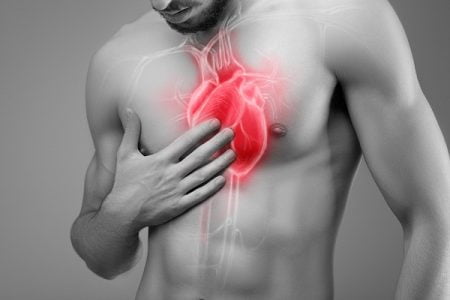Malignant Pericardial Effusion
- Updated on: Jul 5, 2024
- 3 min Read
- Published on Mar 2, 2020

What is Malignant Pericardial Effusion?
Malignant pericardial effusion is a serious manifestation in advanced cancers like lung cancer, breast cancer, melanoma, and hematological melagnancies (leukemia, non-Hodgkin’s lymphoma and Hodgkin’s lymphoma).
This is a condition characterized by cancers which cause extra fluid or blood to collect inside the pericardium of the heart. The extra fluid causes intrapericardial pressure on the heart which leads to a decrease in the cardiac output.
What are the Causes of Malignant Pericardial Effusion?
In cancer patients, pericardial effusion (malignant pericardial effusion) may be developed through different processes:
Direct or Metastatic Spread of Underlying Malignancies
Malignancy-derived pericardial effusion may be caused:
- by the direct spread of the tumor to the parietal pericardium with or without visceral involvement (lung, esophageal, breast carcinoma);
- by metastatic spread of the tumor via blood and lymphocytes (lymphoma, leukemia and melanoma), or because of obstruction in the lymphatic drainage.
Systemic Anticancer Treatment
Management of cancer patients includes combinations of drugs and radiation therapy which can lead to adverse cardiac effects. Pericardial effusion is the most common of them.
Drugs like cyclophosphamide and busulfan commonly used in the treatment of several tumors and lymphomas injure endothelial cells and cardiomyocytes, mediated by toxic metabolism, and can cause pericarditis and myocarditis.
Pericardial effusion may develop as a result of arsenic trioxide administration, which is used for myelogenous leukemia.
Radiation therapy which is exclusively used for treatments of lymphomas, breast cancers and thymomas, can damage cardiac structures (like valves, arteries), but most often causes pericardial effusion.
Infection in the Setting of Immunosuppressive Therapy
In immunocompromised cancer patients, pericardial effusion may be caused by opportunistic infections of virus (cytomegalovirus), bacteria (tuberculosis) and fungus (Aspergillus).
Signs and Symptoms of Malignant Pericardial Effusion
Malignant pericardial effusion may lead to shortness of breath, chest discomfort or chest pain, dyspnea, cough, malaise, fatigue, peripheral edema, palpitations, nausea, weakness and vomiting.
Tachycardia, hypotension, pericardial rub, elevated juglar pressure, decreased heart sounds and peripheral edema are the clinical signs of pericardial effusion.
How is Malignant Pericardial Effusion Diagnosed?
The tests and tools for diagnosis of malignant pericardial effusion include:
Electrocardiogram (ECG)
Electrical activity of the heart is recorded by placing electrodes on the chest. Certain changes like ST elevation in the ECG can signal a pericardial effusion or inflammation in it.
Echocardiogram
It is the best way to check pericardial effusion as it would be easy for a doctor to see the excess fluid in an echocardiogram. Once the effusion is detected, its size and figure can be determined.
Doctors can collect pericardial fluid to find the cause of pericardial effusion. This process is called pericardiocentesis. In this process, inflammatory cytokines, serologic and immunological markers can help to understand the etiology of disease.
How is Malignant Pericardial Effusion Treated?
Doctors may prescribe one of the following treatments to treat pericardial effusion:
- Aspirin
- Corticosteroids,
- Non-steroidal anti-inflammatory drugs like indomethacin or ibuprofen
- Colchicines
FAQs
Can chemotherapy cause pericardial effusion?
In cancer patients, pericardial effusion may arise because of the frequent radiation therapy. Chemotherapy increases the risk of viral, bacterial and fungal infections. In almost 50% cases of cancer patients, pericardial effusion has been diagnosed.
How serious is malignant pericardial effusion?
Pericardial effusion caused due to malignancy is a serious problem and it should be treated promptly. Increased accumulation of fluid or blood in the pericardium can cause cardiac temponade which leads to compression of the heart and reduces its ability to function.
Can chest X-ray detect pericardial effusion?
Chest X-ray is generally performed for chest pain and shortness of breath to detect pericardial fluid around the heart. The most significant sign of pericardial effusion in chest X-ray is enlargement of cardiac silhouette. “Water bottle” appearance of the heart is found on X-ray. Based on chest X-ray reports, echocardiogram is performed for further diagnosis.
What does malignant pericardial effusion sounds like?
Large accumulation of pericardial fluid can muffle the sounds of heart, making them inaudible. A pericardial friction rub from pericarditis may also happen.












